
- Interviews
Doc Filmmaker Jeffrey Schwarz Revives Queer Stories from the Past
Emmy Award-winning Producer Director Jeffrey Schwarz has amassed an extraordinary résumé of documenting remarkable LGBTQ+ pioneers and crucial moments in queer history. His latest feature documentary Commitment to Life, which journals the city of Los Angeles’ reaction to the HIV/AIDS epidemic, premiered earlier this year at the Santa Barbara International Film Festival and will also be presented at Outfest 2023. Other notable work from Schwarz includes the critically acclaimed HBO doc Vito, I Am Divine, Tab Hunter Confidential, The Fabulous Allan Carr and Boulevard, A Hollywood Story. This interview was conducted over Zoom.
I am Divine and Vito are two documentaries on historic LGBTQ+ pioneers. What draws you to highlight iconic queer figures?
In the 80’s and 90’s a discussion of being gay wasn’t really reflected in movies other than as a joke or something to be ashamed about. Obviously now things have changed, but when I came out, I was always searching for people to look up to and follow in their footsteps. “Vito” Russo was one of those people. His book The Celluloid Closet was a story about how gay people were portrayed in movies and so he taught me to observe movies with a new eye and look for hidden gay characters in films that were sort of coded to be gay. He also was part of the early gay liberation movement and became an AIDS activist during the epidemic.
Divine was a very different kind of figure than Vito, he was bigger than life, exuberant, dangerous, very funny and hilarious! He was a poster child for young queer kids who are bullied. They can take all that pain, turn it into something wonderful, beautiful and take revenge on the world by being a bigger than life superstar. So those two magnificent figures I really loved and aspired to reinvigorate for the kids.
You have a love for old Hollywood. Do you feel the LGBTQ+ history in Tinseltown has been swept under the rug?
I love making movies that revive stories from the past. Particularly Boulevard, for it’s a queer love story. In the 50s we couldn’t really tell our own stories. Dickson Hughes and Richard Stapley had to be two men who were composers presenting themselves to the world, as roommates, writing partners and songwriting partners. Now, with Boulevard! A Hollywood Story, we can take a look at what those relationships really were and that we’ve been there the entire time.
Your latest film, Commitment to Life, premiered at the Santa Barbara Film festival. Can share what that documentary is about?
Commitment to Life is a documentary about the AIDS epidemic, as told through the point of view of Hollywood and LA. There have been many films about what happened in New York and San Francisco, but the contribution of Los Angeles, de-stigmatizing HIV and AIDS and calling attention and helping people in the very early days hasn’t fully been explored yet. In America, sometimes we need a celebrity to shine that spotlight of stardom on a problem. In this case, Elizabeth Taylor and organizations like AIDS Project Los Angeles did that.
Finally, you have a documentary in the works about Paul Verhoeven’s Showgirls. Do you think his movie was a “misunderstood masterpiece?”
It’s not for me to call it a masterpiece (laughs), but I do think it’s kind of a masterpiece. I always wanted to do a documentary on Showgirls, because it’s fascinating how something so reviled at the time by our culture is kind of reborn. In my documentary, I’m working on exploring how Showgirls became this iconic cult classic, being celebrated all over the world. Queer people knew from day one, it was special. The way Elizabeth Berkley herself was shamed for expressing her sexuality, a lot of queer people can identify with. I love Paul Verhoeven, so I am excited to get this out to the world.